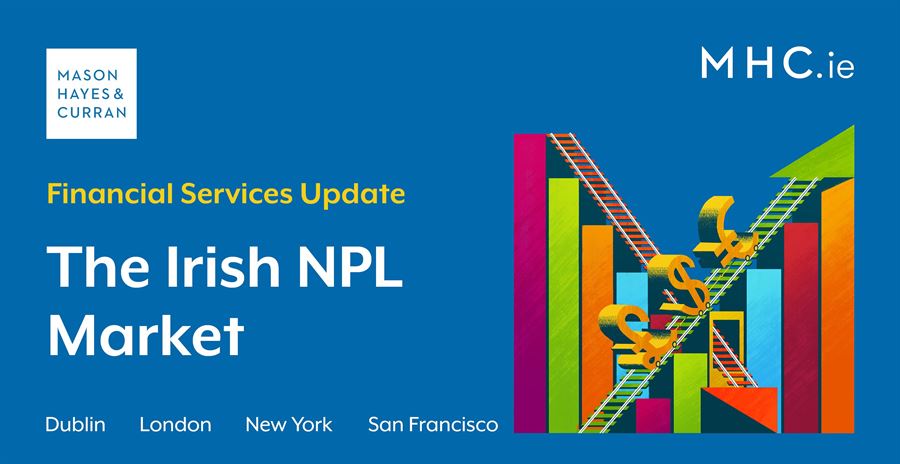
Over the next 18 months, Irish non-performing loan (NPL) levels and portfolio trades are expected to increase due to a number of factors, including:
-
The impact of COVID-19
-
The exit of Ulster Bank and KBC from the Irish market
-
Irish banks disposing of legacy NPLs, and
-
Investment cycles of early loan acquirers ending
The anticipated increase in NPLs will create opportunities in the short to medium term. The precise timing of the opportunities will depend on the unwinding of Government COVID-19 supports and the timing of Ulster Bank and KBC’s exits from the market. These exits will impact on other Irish domestic banks’ plans regarding their deleveraging programmes.
Status of Irish NPLs
Over the last number of years, the Irish banking sector has been working to build resilience and strength in order to better absorb economic shocks. In addition to the Irish “bad bank” NAMA, Irish institutions have all completed EU mandated deleveraging projects.
A wave of NPL sales has resulted in the development of a strong and competitive market for NPLs. The asset classes that have been traded have evolved from commercial real estate and SME loans, to residential property loans. In recent times, the main Irish banks have even started buying portfolios of performing and re-performing loans in order to boost their asset quality and NPL ratios.
The average NPL ratio across Irish banks had been substantially reduced from an average of 17% in 2016 to around 5% at the end of 2019. Due to the unprecedented Government supports provided to individuals and businesses, there has not been a big spike in NPLs due to COVID-19. By the end of 2020, non-performing exposures (NPEs) had only increased slightly in Ireland. However, Irish banks reported material increases in Stage 2 exposures in 2020. Both Moody’s and Fitch predicted that there will be a rise in Irish NPEs in 2021.
Irish banking landscape
The Irish banking sector is in a state of flux at the moment due to Ulster Bank and KBC’s recent decisions to exit the Irish market. As two of the five main retail banks operating in Ireland, Ulster Bank and KBC’s exits will have a material impact on the banking sector.
Ulster Bank has entered into a non-binding memorandum of understanding (MOU) with AIB for the sale of a circa €4 billion portfolio of performing commercial loans. It is in discussions with Permanent TSB regarding the sale of parts of its SME and mortgage portfolio. KBC has entered into a MOU with Bank of Ireland, in relation to the sale of its €9 billion performing loan book. KBC stated that it is reviewing its options to divest its NPL portfolio. We also expect Ulster Bank to similarly be considering its options.
Challenges for the Irish Banking Sector
Ulster Bank and KBC’s exit has sparked discussions about the challenges faced by the Irish banking sector. Over the last number of years, Irish banks have struggled for profitability. Bank of Ireland’s CEO recently summarised the five main challenges faced by the Irish banking sector as:
-
Costs associated with digital investment
-
The ‘lower for longer’ interest rate environment
-
Muted origination of credit
-
The small scale of the Irish market, and
-
The high risk rating attaching to Irish mortgages
Our update regarding Irish banks’ risk weighted assets and a recent Banking & Payments Federation Ireland report is available here.
Comment
There is a mix of issues at play in the Irish NPL market. Many Irish financial institutions entered 2021 with deleveraging targets still to be delivered. The consolidation of the retail banking sector is happening at pace but it has its roots in the aftermath of the global financial crisis. The unwinding of the Government supports will reveal the extent of the NPL exposures post-pandemic. These will be focused in certain sectors. All of these issues create uncertainty which, in turn, means Ireland will remain a country of considerable interest for NPL investors.
Our Financial Services team has experience in advising banks and business on restructuring and deleveraging activities. We have worked on a large volume of competitive and off-market NPL trades over the last number of years. Contact us if you require any assistance or further information.
The content of this article is provided for information purposes only and does not constitute legal or other advice.







